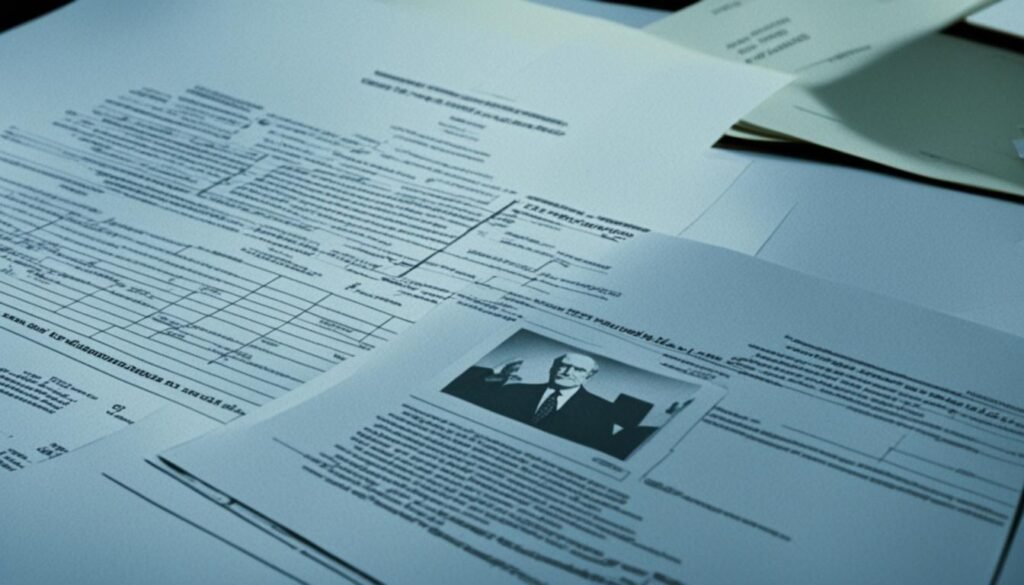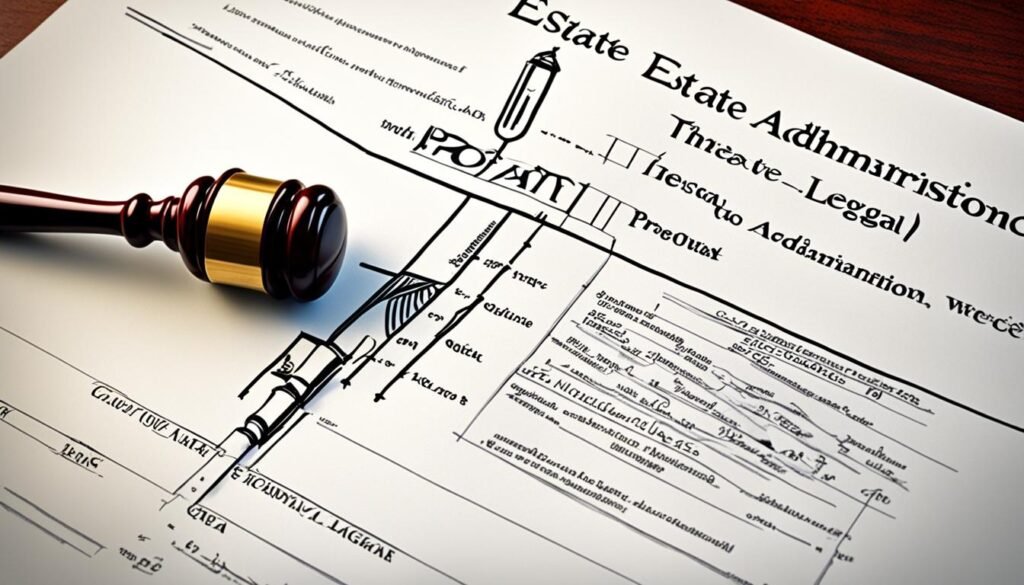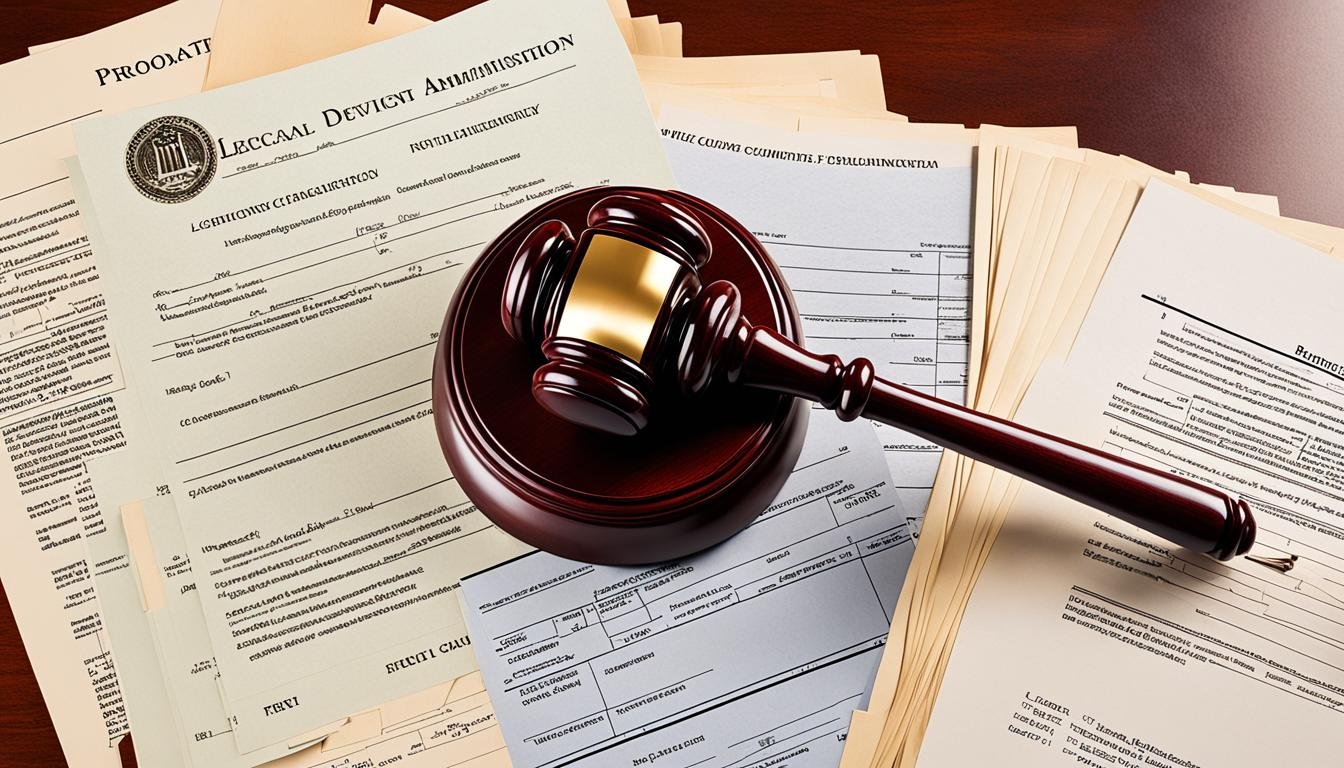Did you know most estates are settled within a year with little court help1? Probate and estate administration are key steps in settling someone’s financial matters and sharing out their assets. Many people don’t fully understand these processes. This article will give you a basic overview of probate and estate administration. It will guide you through the main steps and things to think about to help you through this complex task.
If you’re an executor, administrator, or a beneficiary, knowing the basics of probate and estate administration is crucial. It helps in settling an estate smoothly and efficiently. You’ll need to find important documents and assets, tell creditors and agencies, pay debts and taxes, and share out the rest of the assets. This process is detailed and takes time. Knowing the different steps and options can help you make smart choices and make sure the decedent’s wishes are followed.
Key Takeaways
- Probate and estate administration settle a deceased person’s financial affairs and share out their assets.
- These processes can be complex and take a lot of time, especially for those new to it.
- The majority of estates are probated within a year with minimal court involvement1.
- Probate usually starts a few months after the decedent dies1.
- Executors named in wills are often chosen by the court if it can1.
What is Probate and Estate Administration?
Probate and estate administration are about managing and sharing out what someone leaves behind after they die2. This includes things like houses, money, personal stuff, and more3. The process starts by finding and protecting these things, then paying off debts and taxes. Finally, the rest goes to the people who were meant to get it.
Understanding the Estate and the Decedent
How long probate takes depends on the estate’s size and complexity2. Simple estates get wrapped up faster, but big ones with taxes take longer2. Court delays, like during the pandemic, can slow things down2. If there’s no will, states have rules on who gets what2. Some assets, like those in joint tenancy or life insurance, skip probate and go straight to the right people2.
The Role of an Executor or Administrator
The executor handles the estate if there’s a will, or the administrator if there isn’t3. They must act for the estate and its heirs’ benefit2. Their job includes filing the will, telling heirs and creditors, managing assets, and paying debts and taxes3.
| Term | Explanation |
|---|---|
| Executor | The person appointed to carry out the terms of a will and manage the deceased’s estate. |
| Administrator | The person appointed by the court to manage the estate of someone who died without a will. |
| Fiduciary Duty | The legal obligation of the executor or administrator to act in the best interests of the estate and its beneficiaries. |

“It is recommended to review estate planning documents, such as wills, at least every five years to ensure they reflect current wishes and circumstances.”
The Difference Between Estate Administration and Probate
Estate administration and probate are often mixed up, but they’re not the same. Probate is when the court checks if a will is valid and shares out property as the will says or by state laws. Estate administration is about closing the decedent’s financial matters, which might or might not include probate. Many assets, like those in joint tenancy or with named beneficiaries, can skip probate.4
Admitting a valid Will is called probate. If someone dies without a Will, it’s called administration4. An uncontested probate or administration can get letters testamentary in about four weeks4. The petition goes to the Nassau or Suffolk Surrogate Court4. Without a Will, a notice goes to the legal heirs4. With a Will, a petition names an Executor or Administrator for the estate4.
In Florida, probate comes in two forms: formal and summary administration5. Summary is simpler, while formal is needed for estates needing a personal representative or being too big for summary5. Even with a valid Will, estate administration or probate is a must5.
The Executor or Administrator lists all assets and values properties. They pay off estate debts to the right creditors and, if needed, estate taxes. Then, they give out the assets to the heirs or beneficiaries4.
“The Covid-19 pandemic has led to changes in probate court operations, with many judges now holding hearings by video conference.”5

Key Steps in Settling an Estate
Settling an estate can be complex, but knowing the main steps helps. First, find important documents and assets like the will, death certificate, and financial records6. This makes sure all assets are managed well during the estate process.
Then, the executor or administrator needs to tell creditors and government agencies about the death7. They should contact the Social Security Administration and Medicare, and pay off debts6. Keeping detailed records of the estate’s assets is key for this6.
Another key step is paying off debts, taxes, and final costs like funeral expenses7. This means listing all creditors, filing taxes, and using estate assets to pay off debts before giving out the rest to heirs6. Experts may be needed to value things like art and cars accurately6.
Keeping in touch with beneficiaries is important during the estate settlement8. Executors should handle debts without using their own money and file tax returns8. The last step is giving out the property as the will says or by law, and filing a final report with the court8.
Dealing with estate settlement can be tough, but super attorneys from businesslawyersirvine.com can help make it easier8. By following these steps, executors can make sure the deceased’s wishes are followed and the estate is settled well678.
Probate and Estate Administration Processes
Probate is key in estate administration, a legal process9. It checks if a will is valid, finds who gets what, and picks an executor to share out the stuff left behind9. Without a will, the state decides who gets what and picks an administrator9.
Probate Court Proceedings
The probate court makes sure all debts and taxes are paid and assets go to the right people9. Many assets like retirement accounts and life insurance skip probate with the right beneficiary names9. But, moving these assets can be tricky. Lawyers might suggest special documents to make it easier9.
Small Estate and Informal Probate Procedures
Some estates or when there’s no fight over assets get special probate options10. These include “small estate” and “informal probate” procedures10. In New York, estates over $30,000 need probate with a will, but smaller estates don’t11. These simpler ways can make handling estates cheaper and quicker10.
| Probate Process | Small Estate Procedure | Informal Probate |
|---|---|---|
| Court-supervised process to verify will, identify beneficiaries, and appoint executor | Streamlined paperwork and minimal court involvement for estates below a certain asset threshold | Standardized procedure for estate division in states that follow the Uniform Probate Code |
| Can be costly and time-consuming, especially without a valid will | More efficient and cost-effective for smaller estates | Provides a consistent approach to estate administration |
| Certain assets like retirement accounts can bypass probate | Asset threshold varies by state (e.g., $30,000 in New York) | Adopted by 18 states |
“The judge overseeing probate ensures the will was properly executed, the testator was of sound mind, and there was no undue influence in making the will.”11
Knowing about probate and estate administration helps people and their families deal with the legal stuff better. Whether it’s a big probate case or a simple small estate, getting help from Super Attorneys Near Me at businesslawyersirvine.com can really help9.
Probate and Estate Administration: Understanding Basics
Probate and estate administration are key steps to make sure a person’s final wishes are followed. If you’re dealing with a loved one’s estate or just want to know more, it’s good to understand these basics.
It’s possible to handle probate on your own, following state laws and court rules12. In Kentucky, you can manage probate cases by yourself12. You can get the legal forms from the Circuit Court Clerk or the Kentucky Court of Justice website12.
The probate process can be formal or informal13. A formal process needs detailed records of money in and out, plus payments for the person handling the estate and their lawyer12. An informal process is simpler, where heirs sign a waiver to show they got their share12.
Some estates can skip the full probate process12. This is called dispensing with administration. It’s for people with a small estate who can get their assets without going to court12. For example, a surviving spouse with an estate under $30,000 can ask the court for the property through a special form12.
If you’re lost in the world of probate and estate administration, the team at Super Attorneys Of Irvine can help. They have the knowledge to make sure your loved one’s wishes are respected and the estate is settled right.
Conclusion
Handling Probate and Estate Administration can feel overwhelming, especially when you’re grieving. But, knowing the basics can help you manage it better14. If you need help, the team at Super Attorneys Of Irvine (949-996-9546) is ready to assist you. 1514, They offer personalized support to make sure your loved one’s wishes are followed14.
You don’t have to face this alone. The experts at Super Attorneys Of Irvine are here to use their skills for you14. They’re experts in Estate Planning and can guide you through Probate and Estate Administration. This ensures your assets are distributed smoothly. 151416,
Don’t wait to contact Super Attorneys Of Irvine (949-996-9546) for help. 1416, They’re dedicated to making the process easier and ensuring your loved one’s final wishes are respected. 1514,
FAQ
What is probate and estate administration?
What is the role of an executor or administrator?
What are the key steps in settling an estate?
What is the difference between estate administration and probate?
What are the simplified probate procedures available in some states?
Source Links
- https://www.justia.com/probate/probate-administration/
- https://www.actec.org/resource-center/video/what-is-estate-administration/
- https://www.nccourts.gov/help-topics/wills-and-estates/estates
- https://alpertlegal.com/difference-probate-administration-proceedings/
- https://simmslawfirm.com/probate-or-estate-administration/
- https://www.trustworthy.com/blog/when-someone-dies/settling-an-estate-a-step-by-step-guide
- https://www.araglegal.com/member/learning-center/topics/planning-your-legacy/six-steps-of-probate-process
- https://www.nolo.com/legal-encyclopedia/how-settle-estate.html
- https://www.trustate.com/post/probate-vs-estate-administration-whats-the-difference
- https://www.investopedia.com/terms/p/probate.asp
- https://www.nycbar.org/get-legal-help/article/wills-trusts-and-elder-law/probate-proceeding/
- https://www.kycourts.gov/Legal-Help/Documents/probateguide.pdf
- https://www.elderlawanswers.com/estate-administration-12040
- https://www.bmcestateplanning.com/blog/estate-administration-and-estate-distribution
- https://trustandwill.com/learn/final-distribution-probate
- https://www.delcopa.gov/row/estate.html

